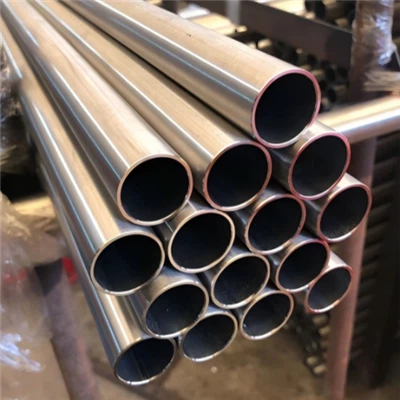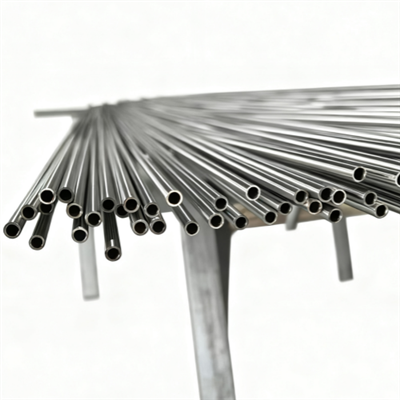As a dedicated supplier of nickel pipes, I've spent years delving into the unique properties of these remarkable materials. One of the most critical yet often overlooked characteristics is the specific heat capacity of nickel pipes. In this blog, I'll explore what specific heat capacity is, how it applies to nickel pipes, and why it matters in various industries.
Understanding Specific Heat Capacity
Specific heat capacity, often denoted as ( c ), is a fundamental physical property of a substance. It is defined as the amount of heat energy required to raise the temperature of one unit mass of the substance by one degree Celsius (or one Kelvin). The SI unit for specific heat capacity is joules per kilogram per degree Celsius (( J/(kg \cdot ^{\circ}C) )).
Mathematically, the relationship between heat energy (( Q )), mass (( m )), specific heat capacity (( c )), and temperature change (( \Delta T )) is given by the formula:


[ Q = m \times c \times \Delta T ]
This formula shows that for a given mass and temperature change, the amount of heat energy required is directly proportional to the specific heat capacity of the substance. Substances with high specific heat capacities can absorb or release large amounts of heat energy with only a small change in temperature, while those with low specific heat capacities experience significant temperature changes with relatively little heat transfer.
Specific Heat Capacity of Nickel and Nickel Alloys
Pure nickel has a specific heat capacity of approximately ( 440 J/(kg \cdot ^{\circ}C) ) at room temperature. However, most nickel pipes are made from nickel alloys, which can have different specific heat capacities depending on their composition.
Nickel alloys are created by combining nickel with other elements such as chromium, molybdenum, iron, and copper to enhance their mechanical, corrosion - resistant, and thermal properties. Some common nickel alloys used in pipe manufacturing include Inconel 625 UNS N06625, Incoloy 825 UNS N08825, and Inconel 718 UNS N07718.
- Inconel 625: This alloy contains nickel, chromium, and molybdenum. Its specific heat capacity is around ( 427 J/(kg \cdot ^{\circ}C) ) at room temperature. Inconel 625 pipes are known for their excellent corrosion resistance in a wide range of environments, including seawater and acidic solutions. The relatively low specific heat capacity of Inconel 625 means that it can heat up and cool down relatively quickly, which can be advantageous in applications where rapid temperature changes are required.
- Incoloy 825: Composed of nickel, iron, chromium, and molybdenum, Incoloy 825 has a specific heat capacity of approximately ( 420 J/(kg \cdot ^{\circ}C) ) at room temperature. Incoloy 825 pipes are highly resistant to corrosion in reducing and oxidizing environments, making them suitable for use in chemical processing, oil and gas, and marine applications. The specific heat capacity of Incoloy 825 allows for efficient heat transfer in these applications.
- Inconel 718: This alloy is a precipitation - hardenable nickel - chromium alloy with a specific heat capacity of about ( 435 J/(kg \cdot ^{\circ}C) ) at room temperature. Inconel 718 pipes are widely used in aerospace and high - temperature applications due to their high strength, good corrosion resistance, and excellent creep resistance at elevated temperatures. The specific heat capacity of Inconel 718 plays a crucial role in managing heat transfer during the operation of aerospace engines and other high - temperature systems.
Importance of Specific Heat Capacity in Nickel Pipe Applications
The specific heat capacity of nickel pipes has significant implications in various industries and applications:
1. Heat Exchangers
In heat exchangers, the ability of a material to transfer heat efficiently is crucial. Nickel pipes with appropriate specific heat capacities can absorb heat from a hot fluid and transfer it to a cold fluid with minimal temperature differences. For example, in a chemical processing plant, Incoloy 825 pipes can be used in heat exchangers to transfer heat between different chemical streams. The relatively low specific heat capacity of Incoloy 825 allows for rapid heat transfer, improving the overall efficiency of the heat exchanger.
2. Power Generation
In power generation plants, nickel pipes are used in boilers, condensers, and other heat - transfer equipment. The specific heat capacity of the pipes affects the amount of heat that can be transferred and the rate at which it can be transferred. Inconel 625 pipes, with their good heat - transfer properties, are often used in high - pressure and high - temperature steam systems. The specific heat capacity of Inconel 625 helps to ensure that the pipes can withstand the thermal stresses associated with steam generation and transfer.
3. Aerospace and Aviation
In the aerospace industry, nickel alloy pipes such as Inconel 718 are used in aircraft engines and other high - temperature components. The specific heat capacity of these pipes is important for managing the heat generated during engine operation. By efficiently absorbing and dissipating heat, Inconel 718 pipes help to maintain the structural integrity of the engine components and prevent overheating.
4. Chemical Processing
Nickel pipes are widely used in chemical processing plants due to their corrosion resistance. The specific heat capacity of the pipes affects the temperature control during chemical reactions. For example, in a reactor where a chemical reaction is exothermic, the pipes can absorb the excess heat generated by the reaction. Inconel 625 pipes, with their suitable specific heat capacity, can help to regulate the temperature of the reaction and prevent thermal runaway.
Factors Affecting the Specific Heat Capacity of Nickel Pipes
The specific heat capacity of nickel pipes can be influenced by several factors:
1. Alloy Composition
As mentioned earlier, the addition of different alloying elements can change the specific heat capacity of nickel pipes. For example, increasing the chromium content in a nickel - chromium alloy can slightly decrease the specific heat capacity. The exact effect of alloying elements on specific heat capacity depends on their atomic structure and interaction with the nickel matrix.
2. Temperature
The specific heat capacity of nickel pipes is not constant and can vary with temperature. Generally, the specific heat capacity of metals increases with increasing temperature. This is because at higher temperatures, the atoms in the metal have more energy and can vibrate more freely, allowing them to absorb more heat energy.
3. Microstructure
The microstructure of the nickel pipes, such as grain size and phase composition, can also affect the specific heat capacity. Fine - grained microstructures may have slightly different specific heat capacities compared to coarse - grained microstructures due to differences in atomic packing and lattice vibrations.
Conclusion
The specific heat capacity of nickel pipes is a critical property that affects their performance in various applications. As a nickel pipe supplier, understanding the specific heat capacity of different nickel alloys allows us to recommend the most suitable pipes for our customers' needs. Whether it's for heat exchangers in chemical plants, high - temperature components in aerospace engines, or power generation systems, the specific heat capacity of nickel pipes plays a vital role in ensuring efficient heat transfer and reliable operation.
If you are in need of high - quality nickel pipes for your specific application, I encourage you to reach out to us. We have a wide range of nickel alloy pipes available, including Inconel 625 UNS N06625, Incoloy 825 UNS N08825, and Inconel 718 UNS N07718. Our team of experts can provide you with detailed technical information and help you select the best pipes for your project. Contact us today to start the procurement process and discuss your requirements.
References
- "Thermophysical Properties of Nickel and Nickel Alloys" - Handbook of Thermophysical Properties
- "Nickel Alloys: Composition, Properties, and Applications" - ASM International






